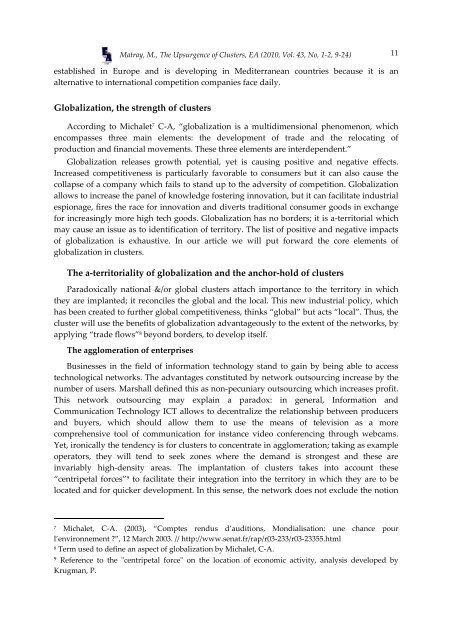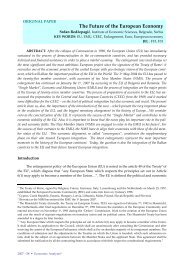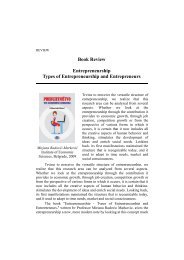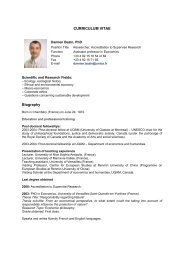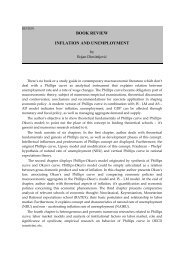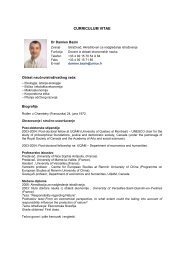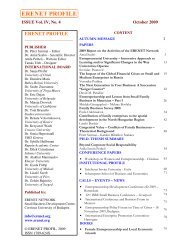Twice a Year Scientific Journal
Twice a Year Scientific Journal
Twice a Year Scientific Journal
Create successful ePaper yourself
Turn your PDF publications into a flip-book with our unique Google optimized e-Paper software.
Matray, M., The Upsurgence of Clusters, EA (2010, Vol. 43, No, 1-2, 9-24) 11<br />
established in Europe and is developing in Mediterranean countries because it is an<br />
alternative to international competition companies face daily.<br />
Globalization, the strength of clusters<br />
According to Michalet 7 C-A, “globalization is a multidimensional phenomenon, which<br />
encompasses three main elements: the development of trade and the relocating of<br />
production and financial movements. These three elements are interdependent.”<br />
Globalization releases growth potential, yet is causing positive and negative effects.<br />
Increased competitiveness is particularly favorable to consumers but it can also cause the<br />
collapse of a company which fails to stand up to the adversity of competition. Globalization<br />
allows to increase the panel of knowledge fostering innovation, but it can facilitate industrial<br />
espionage, fires the race for innovation and diverts traditional consumer goods in exchange<br />
for increasingly more high tech goods. Globalization has no borders; it is a-territorial which<br />
may cause an issue as to identification of territory. The list of positive and negative impacts<br />
of globalization is exhaustive. In our article we will put forward the core elements of<br />
globalization in clusters.<br />
The a-territoriality of globalization and the anchor-hold of clusters<br />
Paradoxically national &/or global clusters attach importance to the territory in which<br />
they are implanted; it reconciles the global and the local. This new industrial policy, which<br />
has been created to further global competitiveness, thinks “global” but acts “local”. Thus, the<br />
cluster will use the benefits of globalization advantageously to the extent of the networks, by<br />
applying “trade flows” 8 beyond borders, to develop itself.<br />
The agglomeration of enterprises<br />
Businesses in the field of information technology stand to gain by being able to access<br />
technological networks. The advantages constituted by network outsourcing increase by the<br />
number of users. Marshall defined this as non-pecuniary outsourcing which increases profit.<br />
This network outsourcing may explain a paradox: in general, Information and<br />
Communication Technology ICT allows to decentralize the relationship between producers<br />
and buyers, which should allow them to use the means of television as a more<br />
comprehensive tool of communication for instance video conferencing through webcams.<br />
Yet, ironically the tendency is for clusters to concentrate in agglomeration; taking as example<br />
operators, they will tend to seek zones where the demand is strongest and these are<br />
invariably high-density areas. The implantation of clusters takes into account these<br />
“centripetal forces” 9 to facilitate their integration into the territory in which they are to be<br />
located and for quicker development. In this sense, the network does not exclude the notion<br />
7<br />
Michalet, C-A. (2003), “Comptes rendus d’auditions, Mondialisation: une chance pour<br />
l’environnement ?”, 12 March 2003. // http://www.senat.fr/rap/r03-233/r03-23355.html<br />
8<br />
Term used to define an aspect of globalization by Michalet, C-A.<br />
9<br />
Reference to the ʺcentripetal forceʺ on the location of economic activity, analysis developed by<br />
Krugman, P.


